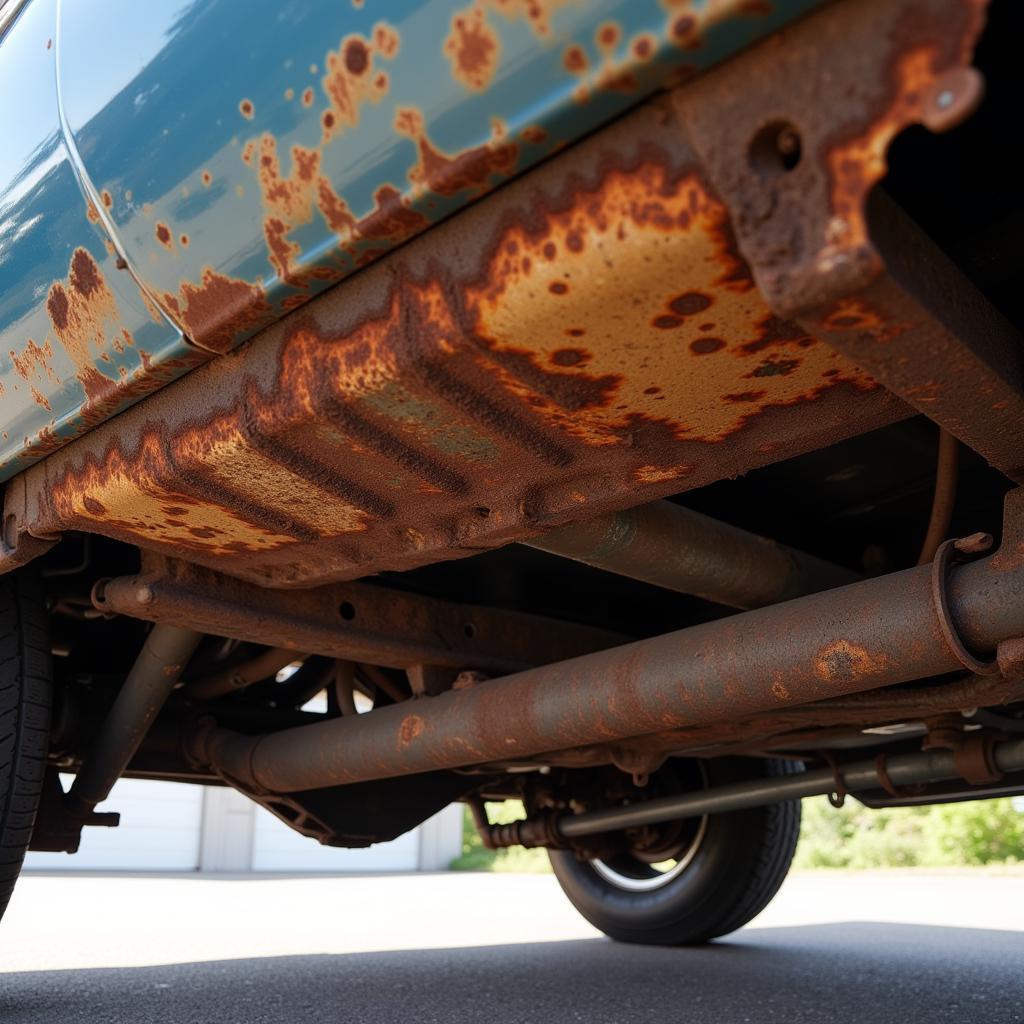Muscle cars: the epitome of American automotive power and style. But beneath the gleaming chrome and rumbling V8s, many of these iconic vehicles hide common problems that owners often overlook. Whether you’re a seasoned mechanic or a weekend warrior, understanding these issues is crucial for keeping your muscle car running strong.
Hidden Headaches: Common Muscle Car Problems
These powerful machines demand respect and proper maintenance. Ignoring seemingly minor issues can lead to costly repairs down the road. Let’s dive into 20 muscle car problems frequently swept under the rug.
Rust: The Silent Killer
Rust is the nemesis of any classic car, and muscle cars are no exception. Often starting in hidden areas like the undercarriage, rocker panels, and wheel wells, rust can quickly spread and compromise the structural integrity of your vehicle. Regular inspections and preventative measures like undercoating are essential.
 Rust on a Muscle Car Undercarriage
Rust on a Muscle Car Undercarriage
Electrical Gremlins: Tracing the Source
Older muscle cars are notorious for their finicky electrical systems. From faulty wiring to failing alternators, these issues can manifest in various ways, from dimming headlights to a complete no-start situation. A good multimeter and wiring diagram are your best friends when tackling these problems.
Carburetor Woes: Fuel System Frustrations
Carburetors, while providing that classic muscle car rumble, can be a source of constant frustration. Clogged jets, vacuum leaks, and float adjustments are just a few of the issues that can plague these fuel delivery systems. Learning the ins and outs of your specific carburetor is key to keeping it running smoothly.
Cooling System Conundrums: Keeping it Cool Under Pressure
High-performance engines generate a lot of heat, and a robust cooling system is crucial. From leaky radiators to malfunctioning thermostats, overheating can quickly lead to catastrophic engine damage. Regularly checking coolant levels and inspecting hoses is a must.
Brake Fade: Stopping Power Struggles
Muscle cars are known for their go, but their stopping power can sometimes be lacking. Brake fade, caused by overheating brake components, can significantly reduce braking performance. Upgrading to performance brake pads and rotors can improve stopping power and reliability.
Suspension Sag: A Common Muscle Car Problem
Years of wear and tear can take a toll on a muscle car’s suspension. Sagging springs and worn-out shocks can negatively impact handling and ride comfort. Replacing these components can restore your car’s stance and improve its driving dynamics.
Exhaust Leaks: More Than Just a Noise
While a rumbling exhaust is part of the muscle car experience, excessive noise could indicate leaks. Exhaust leaks can not only reduce performance but also pose a safety hazard due to carbon monoxide poisoning.
Transmission Troubles: Shifting Gears Smoothly
Whether it’s a manual or automatic, transmission problems can be a real headache. From grinding gears to slipping clutches, these issues can make driving your muscle car a chore. Regular fluid changes and proper maintenance can help prevent these problems.
20 Muscle Cars with Problems: A Closer Look
Specific models often have their own quirks. For example, some early Mustangs are known for rust issues in the cowl area, while certain Camaros can suffer from rear axle problems. Researching your specific make and model can help you identify potential problem areas.
Ignoring Problems: A Costly Mistake
“Ignoring minor issues can quickly snowball into major repairs,” says John Miller, a veteran muscle car mechanic with over 30 years of experience. “Preventative maintenance is key to keeping these cars on the road.”
DIY vs. Professional Repairs
While some muscle car problems can be tackled by DIY enthusiasts, others require the expertise of a qualified mechanic. Knowing your limitations is crucial. “Don’t be afraid to seek professional help when needed,” adds Miller. “It can save you time, money, and frustration in the long run.”
Why Do People Ignore These Issues?
Sometimes, owners simply aren’t aware of these common problems. Other times, they may be tempted to put off repairs due to the cost. However, neglecting these issues can ultimately lead to more expensive repairs down the road.
The Importance of Regular Maintenance
Regular maintenance is the best way to prevent many of these problems from occurring in the first place. This includes regular oil changes, fluid checks, and inspections. “A little preventative maintenance can go a long way,” says Sarah Johnson, a classic car restoration specialist.
Keeping Your Muscle Car Running Strong
Owning a muscle car is a rewarding experience. By understanding and addressing these common problems, you can keep your classic ride running strong for years to come. Remember, regular maintenance and addressing issues early on are key to enjoying your muscle car to its fullest. For any assistance with your muscle car needs, feel free to connect with us at AutoTipPro. Our phone number is +1 (641) 206-8880, and our office is located at 500 N St Mary’s St, San Antonio, TX 78205, United States.





Leave a Reply